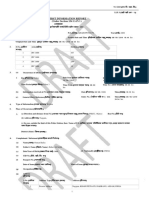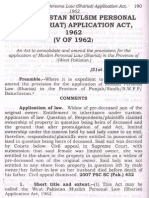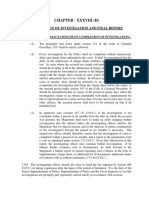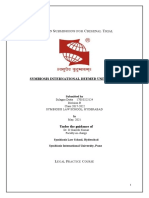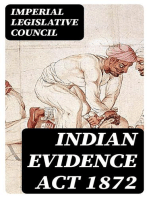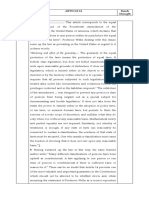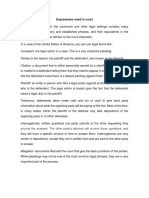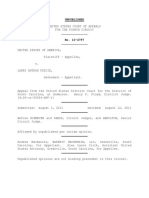Sl. No. S.173, Code of Criminal Procedure Bench Streng TH 11. When A Report Forwarded by The Police To The Magistrate
Sl. No. S.173, Code of Criminal Procedure Bench Streng TH 11. When A Report Forwarded by The Police To The Magistrate
Uploaded by
Abhishek SharmaCopyright:
Available Formats
Sl. No. S.173, Code of Criminal Procedure Bench Streng TH 11. When A Report Forwarded by The Police To The Magistrate
Sl. No. S.173, Code of Criminal Procedure Bench Streng TH 11. When A Report Forwarded by The Police To The Magistrate
Uploaded by
Abhishek SharmaOriginal Description:
Original Title
Copyright
Available Formats
Share this document
Did you find this document useful?
Is this content inappropriate?
Copyright:
Available Formats
Sl. No. S.173, Code of Criminal Procedure Bench Streng TH 11. When A Report Forwarded by The Police To The Magistrate
Sl. No. S.173, Code of Criminal Procedure Bench Streng TH 11. When A Report Forwarded by The Police To The Magistrate
Uploaded by
Abhishek SharmaCopyright:
Available Formats
Sl.
S.173, CODE OF CRIMINAL PROCEDURE
Bench
No.
Streng
th
11. When a report forwarded by the police to the Magistrate
under Section 173(2)(i) is placed before him several
situations arise: the report may conclude that an offence
appears to have been committed by a particular person or
persons and in such a case, the Magistrate may either (1)
accept the report and take cognizance of the offence and
issue process, or (2) may disagree with the report and drop
the proceeding, or (3) may direct further investigation under
Section 156(3) and require the police to make a further
report. The report may on the other hand state that
according to the police, no offence appears to have been
committed. When such a report is placed before the
Magistrate he again has option of adopting one of the three
courses open i.e. (1) he may accept the report and drop the
proceeding; or (2) he may disagree with the report and take
the
view
that
there
is
sufficient
ground
for
further
proceeding, take cognizance of the offence and issue
process; or (3) he may direct further investigation to be
made by the police under Section 156(3). The position is,
therefore, now well settled that upon receipt of a police
report under Section 173(2) a Magistrate is entitled to take
cognizance of an offence under Section 190(1)(b) of the
Code even if the police report is to the effect that no case is
made out against the accused. The Magistrate can take into
account the statements of the witnesses examined by the
police during the investigation and take cognizance of the
offence complained of and order the issue of process to the
accused. Section 190(1)(b) does not lay down that a
Magistrate can take cognizance of an offence only if the
investigating officer gives an opinion that the investigation
Sl.
S.173, CODE OF CRIMINAL PROCEDURE
No.
Bench
Streng
th
has made out a case against the accused. The Magistrate
can ignore the conclusion arrived at by the investigating
officer and independently apply his mind to the facts
emerging from the investigation and take cognizance of the
case, if he thinks fit, exercise his powers under Section
190(1)(b) and direct the issue of process to the accused. The
Magistrate is not bound in such a situation to follow the
procedure laid down in Sections 200 and 202 of the Code for
taking cognizance of a case under Section 190(1)(a) though
it is open to him to act under Section 200 or Section 202
also. (See India Carat (P) Ltd. v. State of Karnataka2.)
12. The informant is not prejudicially affected when the
Magistrate decides to take cognizance and to proceed with
the case. But where the Magistrate decides that sufficient
ground does not subsist for proceeding further and drops the
proceeding or takes the view that there is material for
proceeding against some and there are insufficient grounds
in respect of others, the informant would certainly be
prejudiced as the first information report lodged becomes
wholly or partially ineffective. This Court in Bhagwant Singh
v. Commr. of Police3 held that where the Magistrate decides
not to take cognizance and to drop the proceeding or takes a
view that there is no sufficient ground for proceeding against
some of the persons mentioned in the first information
report, notice to the informant and grant of opportunity of
being heard in the matter becomes mandatory. As indicated
above, there is no provision in the Code for issue of a notice
in that regard.
13. We may add here that the expressions charge-sheet or
final report are not used in the Code, but it is understood
Sl.
S.173, CODE OF CRIMINAL PROCEDURE
No.
Bench
Streng
th
in Police Manuals of several States containing the rules and
the regulations to be a report by the police filed under
Section 170 of the Code, described as a charge-sheet. In
case of reports sent under Section 169 i.e. where there is no
sufficiency of evidence to justify forwarding of a case to a
Magistrate, it is termed variously i.e. referred charge, final
report or summary. Section 173 in terms does not refer to
any notice to be given to raise any protest to the report
submitted by the police. Though the notice issued under
some of the Police Manuals states it to be a notice under
Section 173 of the Code, there is nothing in Section 173
specifically providing for such a notice.
14. As decided by this Court in Bhagwant Singh case3 the
Magistrate has to give the notice to the informant and
provide
an opportunity
to be heard at the time of
consideration of the report. It was noted as follows: (SCC p.
542, para 4)
[T]he Magistrate must give notice to the informant and
provide him an opportunity to be heard at the time of
consideration of the report.
15. Therefore, the stress is on the issue of notice by the
Magistrate at the time of consideration of the report. If the
informant is not aware as to when the matter is to be
considered, obviously, he cannot be faulted, even if protest
petition in reply to the notice issued by the police has been
filed belatedly. But as indicated in Bhagwant Singh case3 the
right is conferred on the informant and none else.
Minu Kumari v. State of Bihar, (2006) 4 SCC 359
14. Sub-section (1) of Section 173 CrPC makes it clear that
every investigation shall be completed without unnecessary
Sl.
S.173, CODE OF CRIMINAL PROCEDURE
Bench
No.
Streng
th
delay. Sub-section (2) mandates that as soon as the
investigation is completed, the officer in charge of the police
station shall forward to a Magistrate empowered to take
cognizance of the offence on a police report, a report in the
form prescribed by the State Government mentioning the
name of the parties, nature of
persons
who
appear
to
information, name of the
be
acquainted
with
the
circumstances of the case and further particulars such as the
name of the offences that have been committed, arrest of
the accused and details about his release with or without
sureties.
15. Among the other sub-sections, we are very much
concerned about sub-section (8) of Section 173 which reads
as under:
173. (8) Nothing in this section shall be deemed to preclude
further investigation in respect of an offence after a report
under sub-section (2) has been forwarded to the Magistrate
and, where upon such investigation, the officer in charge of
the
police
station
obtains
further
evidence,
oral
or
documentary, he shall forward to the Magistrate a further
report or reports regarding such evidence in the form
prescribed; and the provisions of sub-sections (2) to (6) shall,
as far as may be, apply in relation to such report or reports
as they apply in relation to a report forwarded under subsection (2).
A mere reading of the above provision makes it clear that
irrespective of the report under sub-section (2) forwarded to
the Magistrate, if the officer in charge of the police station
obtains further evidence, it is incumbent on his part to
forward the same to the Magistrate with a further report with
Sl.
S.173, CODE OF CRIMINAL PROCEDURE
Bench
No.
Streng
th
regard to such evidence in the form prescribed. The
abovesaid
provision
also
makes
it
clear
that
further
investigation is permissible, however, reinvestigation is
prohibited.
16. The law does not mandate taking of prior permission
from the Magistrate for further investigation. Carrying out a
further investigation even after filing of the charge-sheet is a
statutory right of the police. Reinvestigation without prior
permission
is
prohibited.
On
the
other
hand,
further
investigation is permissible.
17. From a plain reading of sub-section (2) and sub-section
(8) of Section 173, it is evident that even after submission of
the police report under sub-section (2) on completion of the
investigation, the police has a right to further investigation
under sub-section (8) of Section 173 but not fresh
investigation or reinvestigation. The meaning of further
is additional, more, or supplemental. Further investigation,
therefore, is the continuation of the earlier investigation and
not a fresh investigation or reinvestigation to be started ab
initio wiping out the earlier investigation altogether.
18. Sub-section (8) of Section 173 clearly envisages that on
completion of further investigation, the investigating agency
has to forward to the Magistrate a further report and not a
fresh report regarding the further evidence obtained
during such investigation.
19. As observed in Hasanbhai Valibhai Qureshi v. State of
Gujarat1 the prime consideration for further investigation is
to arrive at the truth and do real and substantial justice. The
hands of the investigating agency for further investigation
should not be tied down on the ground of mere delay. In
Sl.
S.173, CODE OF CRIMINAL PROCEDURE
Bench
No.
Streng
th
other words
[t]he mere fact that there may be further delay in
concluding the trial should not stand in the way of further
investigation if that would help the court in arriving at the
truth and do real and substantial as well as effective justice.
(SCC p. 351, para 13)
22. The law does not mandate taking prior permission from
the Magistrate for further investigation. It is settled law that
carrying out further investigation even after filing of the
charge-sheet is a statutory right of the police (vide K.
Chandrasekhar v. State of Kerala2). The material collected in
further investigation cannot be rejected only because it has
been filed at the stage of the trial. The facts and
circumstances show that the trial court is fully justified to
summon witnesses examined in the course of further
investigation. It is also clear from Section 231 CrPC that the
prosecution is entitled to produce any person as witness
even though such person is not named in the earlier chargesheet.
Rama Chaudhary v. State of Bihar, (2009) 6 SCC 346
9. Though under the old Code there was no express
provision like sub-section (8) of Section 173 of the Code
statutorily empowering the police to further investigate into
an offence in respect of which a charge-sheet has already
been filed and cognizance taken under Section 190(1)(b),
such a power was recognised by this Court in Ram Lal
Narang
v.
State
(Delhi
Admn.)4.
In
exemplifying
the
situations which may prevail upon the police to take up
further investigation and the procedure the Court may have
Sl.
S.173, CODE OF CRIMINAL PROCEDURE
No.
Bench
Streng
th
to follow on receipt of the supplemental report of such
investigation, this Court observed: (SCC p. 337, para 20)
It is easy to visualise a case where fresh material may
come to light which would implicate persons not previously
accused or absolve persons already accused. When it comes
to the notice of the investigating agency that a person
already accused of an offence has a good alibi, is it not the
duty of that agency to investigate the genuineness of the
plea of alibi and submit a report to the Magistrate? After all
the investigating agency has greater resources at its
command than a private individual. Similarly, where the
involvement of persons who are not already accused comes
to the notice of the investigating agency, the investigating
agency cannot keep quiet and refuse to investigate the fresh
information. It is their duty to investigate and submit a
report to the Magistrate upon the involvement of the other
persons. In either case, it is for the Magistrate to decide
upon his future course of action depending upon the stage at
which the case is before him. If he has already taken
cognizance of the offence, but has not proceeded with the
enquiry or trial, he may direct the issue of process to
persons freshly discovered to be involved and deal with all
the accused in a single enquiry or trial. If the case of which
he has previously taken cognizance has already proceeded
to some extent, he may take fresh cognizance of the offence
disclosed against the newly involved accused and proceed
with the case as a separate case. What action a Magistrate is
to take in accordance with the provisions of the Code of
Criminal Procedure in such situations is a matter best left to
the discretion of the Magistrate.
Sl.
S.173, CODE OF CRIMINAL PROCEDURE
No.
Bench
Streng
th
State v. Dawood Ibrahim Kaskar, (2000) 10 SCC 438
LIST OF JUDGMENTS
1.
2.
3.
4. Minu Kumari v. State of Bihar
(2006) 4 SCC
359
5. Rama Chaudhary v. State of Bihar
(2009) 6 SCC
346
6.
7.
8.
9.
10.
11.
GROUNDS PREVIOUSLY TAKEN BY LITIGANTS
Sl.
S.173, CODE OF CRIMINAL PROCEDURE
No.
Bench
Streng
th
REPLY TO GROUNDS PREVIOUSLY TAKEN BY LITIGANTS
You might also like
- Bombay High Court Original Side RulesDocument308 pagesBombay High Court Original Side RulesAbhishek Sharma92% (13)
- Bombay High Court Appellate Side RulesDocument198 pagesBombay High Court Appellate Side RulesAbhishek Sharma50% (4)
- Arce+Order,+D +arizonaDocument42 pagesArce+Order,+D +arizonaValerie Strauss100% (1)
- Essential Soft Skills for Lawyers: What They Are and How to Develop ThemFrom EverandEssential Soft Skills for Lawyers: What They Are and How to Develop ThemNo ratings yet
- Prof Ethics QuizDocument30 pagesProf Ethics QuizChirag ShahNo ratings yet
- Summary SuitsDocument18 pagesSummary SuitsRajendra KumarNo ratings yet
- The Extinctive Effect of Promossory EstoppelDocument9 pagesThe Extinctive Effect of Promossory EstoppelSiu Chen LimNo ratings yet
- How To Fight Against A False Rape AccusationDocument5 pagesHow To Fight Against A False Rape AccusationArushi BishtNo ratings yet
- Principle of ParityDocument4 pagesPrinciple of ParityAbhishek SharmaNo ratings yet
- Bar Council of India Rules, Part V OnwardsDocument102 pagesBar Council of India Rules, Part V OnwardsAbhishek Sharma100% (1)
- Bombay High Court Original Side FormsDocument147 pagesBombay High Court Original Side FormsAbhishek Sharma100% (3)
- Sec Cert For CasesDocument3 pagesSec Cert For CasesGerard Nelson ManaloNo ratings yet
- CRPC ProjectDocument25 pagesCRPC ProjectujjawalchaudharyNo ratings yet
- Trail of Summon Cases CRPC ProjectDocument17 pagesTrail of Summon Cases CRPC ProjectpriyanshuNo ratings yet
- 2017-01-13 21-56-58 Lalita Kumari V State of UP 2013 4 Crimes (SC) 243Document42 pages2017-01-13 21-56-58 Lalita Kumari V State of UP 2013 4 Crimes (SC) 243Anil BaddiNo ratings yet
- Ipc Amendment 2013Document20 pagesIpc Amendment 2013Sushil ShuklaNo ratings yet
- Shelton McElroy Lawsuit Against Cordish, LMPDDocument35 pagesShelton McElroy Lawsuit Against Cordish, LMPDInsider LouisvilleNo ratings yet
- Agreement For Sale of PropertyDocument2 pagesAgreement For Sale of PropertyDikshagoyal123No ratings yet
- CRPCDocument10 pagesCRPCSanaur RahmanNo ratings yet
- Index: Particulars Dated Pages Court Fee Bail Application 1-2 Affidavit Power of Attorney Photo Copy of Adhar CardDocument6 pagesIndex: Particulars Dated Pages Court Fee Bail Application 1-2 Affidavit Power of Attorney Photo Copy of Adhar CardRvi MahayNo ratings yet
- Hybrid Agreement Business Project Management ReportDocument45 pagesHybrid Agreement Business Project Management Reportandrei4i2005No ratings yet
- Framing of ChargesDocument7 pagesFraming of ChargesLakshmi Shankar RayapureddyNo ratings yet
- Paper-Book For Index Kindly See Inside: Advocate For The Petitioners-Purvish MalkanDocument18 pagesPaper-Book For Index Kindly See Inside: Advocate For The Petitioners-Purvish MalkanarjunNo ratings yet
- Supreme Court Judgement On Mere Long Possession Does Not Confer Any Legal Right Over The PropertyDocument11 pagesSupreme Court Judgement On Mere Long Possession Does Not Confer Any Legal Right Over The PropertyLatest Laws TeamNo ratings yet
- Recovery SuiteDocument5 pagesRecovery SuiteChandandeep SinghNo ratings yet
- In The Supreme Court of India: - The Black S Law Dictionary Defines Bail AsDocument9 pagesIn The Supreme Court of India: - The Black S Law Dictionary Defines Bail AsGaurav GoyalNo ratings yet
- 10 - Chapter 4 Search - Seizure and Personal LibertyDocument96 pages10 - Chapter 4 Search - Seizure and Personal LibertyMG MaheshBabuNo ratings yet
- First Information Report (Under Section 154 CR.P.C.) : 1 IPC 1860 447 2 IPC 1860 325 3 IPC 1860 294 4 IPC 1860 34Document4 pagesFirst Information Report (Under Section 154 CR.P.C.) : 1 IPC 1860 447 2 IPC 1860 325 3 IPC 1860 294 4 IPC 1860 34Raaj ChoudhuryNo ratings yet
- Role of Hostile Witnesses in The Administration of Criminal JusticeDocument15 pagesRole of Hostile Witnesses in The Administration of Criminal JusticeDeepsy FaldessaiNo ratings yet
- Rbi Notification and ResearchDocument7 pagesRbi Notification and ResearchParth BhutaNo ratings yet
- Defects in InvestigationDocument10 pagesDefects in InvestigationSurender SinghNo ratings yet
- Admission and ConfessionDocument9 pagesAdmission and ConfessionAmmirul AimanNo ratings yet
- 320 - 482Document35 pages320 - 482Abhishek SharmaNo ratings yet
- Pankaj Agrawal Vs Rajiv AgrawalDocument5 pagesPankaj Agrawal Vs Rajiv Agrawalmithun7No ratings yet
- 4.need For Re-Consideration of Law of Limitation For Exclusion of TimeDocument9 pages4.need For Re-Consideration of Law of Limitation For Exclusion of TimeEraNo ratings yet
- Types of Appeals Under The Code of Civil ProcedureDocument19 pagesTypes of Appeals Under The Code of Civil ProcedureManDeepWarwalNo ratings yet
- 9-Disposal of Case Property-By SMT M ShubhavaniDocument10 pages9-Disposal of Case Property-By SMT M ShubhavaniaswinecebeNo ratings yet
- 95d41unlawful Object and ConsiderationDocument15 pages95d41unlawful Object and ConsiderationAbhimanyu NirulaNo ratings yet
- LGO ComplaintDocument63 pagesLGO ComplaintLGOComplaintNo ratings yet
- 79) DraftDocument167 pages79) DraftSaakshi BhavsarNo ratings yet
- Documentary and Factual Verification in Writ Jurisdiction of High Court 2008 SCDocument26 pagesDocumentary and Factual Verification in Writ Jurisdiction of High Court 2008 SCSridhara babu. N - ಶ್ರೀಧರ ಬಾಬು. ಎನ್No ratings yet
- Iridium India Telecom Ltd. v. Motorola Inc., (2005) 2 SCC 145Document7 pagesIridium India Telecom Ltd. v. Motorola Inc., (2005) 2 SCC 145Kishan PatelNo ratings yet
- Exclusion /ouster of Jurisdiction of Civil CourtDocument10 pagesExclusion /ouster of Jurisdiction of Civil CourtlukeNo ratings yet
- 1.principles of Evidence - Appreciation in Civil & Criminal CasesDocument20 pages1.principles of Evidence - Appreciation in Civil & Criminal CasesNISHANTNo ratings yet
- West Punjab Muslim Personal Law Application Act 1962Document11 pagesWest Punjab Muslim Personal Law Application Act 1962Shakeel Ahmed ButtNo ratings yet
- Police Final ReportDocument8 pagesPolice Final ReportGeor GieNo ratings yet
- Three Principles of Criminal JurisprudenceDocument4 pagesThree Principles of Criminal JurisprudenceArbab Ihtishamul Haq KhalilNo ratings yet
- Mesne ProfitsDocument41 pagesMesne ProfitsBiswatosh DharNo ratings yet
- Project - Proceedings-Civil - Criminal Suit-21-06-23-FINALDocument15 pagesProject - Proceedings-Civil - Criminal Suit-21-06-23-FINALManisha VermaNo ratings yet
- SCOPE and Significance 313 Cr.P.C.Document13 pagesSCOPE and Significance 313 Cr.P.C.Mrudula Ganesh100% (1)
- Arms Act CaseDocument12 pagesArms Act CaseSatyendra ChauhanNo ratings yet
- 133 CRPC School OrderDocument7 pages133 CRPC School OrderMoving StepNo ratings yet
- Nirbhaya Case Judgement PDFDocument33 pagesNirbhaya Case Judgement PDFSampath Kumar GummadiNo ratings yet
- Evidence ProjectDocument16 pagesEvidence ProjectTushant SharmaNo ratings yet
- Similar Fact EvidenceDocument5 pagesSimilar Fact EvidenceCarley GuanNo ratings yet
- Contents of A ChargeDocument16 pagesContents of A Chargehimani baidNo ratings yet
- Indian Evidence Act Part - I CHAPTER - II (17 - 31)Document14 pagesIndian Evidence Act Part - I CHAPTER - II (17 - 31)sachet12No ratings yet
- Sundeep Kumar Bafna vs. State of Maharashtra & ANR.Document40 pagesSundeep Kumar Bafna vs. State of Maharashtra & ANR.Live Law80% (5)
- Examination in Chief ExampleDocument4 pagesExamination in Chief ExampleNaveen PatilNo ratings yet
- COMPLAINT - CRPC - Judicial Training - Institute - LucknowDocument43 pagesCOMPLAINT - CRPC - Judicial Training - Institute - LucknowhimanshuNo ratings yet
- S. 91 - 100 Evidence ActDocument12 pagesS. 91 - 100 Evidence ActRenu GothwalNo ratings yet
- DR - Ram Manohar Lohiya National Law UniversityDocument13 pagesDR - Ram Manohar Lohiya National Law Universityjinisha sharmaNo ratings yet
- Criminal Trial-SubmissionsDocument38 pagesCriminal Trial-SubmissionsSULAGNA DUTTANo ratings yet
- Cr. P CDocument59 pagesCr. P CSonali SinghNo ratings yet
- Shivani CPCDocument14 pagesShivani CPCHeena ShaikhNo ratings yet
- Title NO.211 (As Per Workshop List Title No211 PDFDocument23 pagesTitle NO.211 (As Per Workshop List Title No211 PDFJappreet SinghNo ratings yet
- Appreciation of Evidence CriminalDocument18 pagesAppreciation of Evidence CriminalAbhishek SharmaNo ratings yet
- Circumstantial EvidenceDocument12 pagesCircumstantial EvidenceAbhishek SharmaNo ratings yet
- SC-UoI Panel 11.12.14Document29 pagesSC-UoI Panel 11.12.14Abhishek SharmaNo ratings yet
- Bail & Anticipatory BailDocument76 pagesBail & Anticipatory BailAbhishek SharmaNo ratings yet
- Advanced Rulings - Income Tax PDFDocument222 pagesAdvanced Rulings - Income Tax PDFAbhishek Sharma0% (1)
- Section Article 14 Bench Strength 8............................................. This Article Corresponds To The EqualDocument34 pagesSection Article 14 Bench Strength 8............................................. This Article Corresponds To The EqualAbhishek SharmaNo ratings yet
- Sl. No. Legislative Power Bench StrengthDocument6 pagesSl. No. Legislative Power Bench StrengthAbhishek SharmaNo ratings yet
- Signature Not VerifiedDocument28 pagesSignature Not VerifiedAbhishek SharmaNo ratings yet
- 227 239 251Document55 pages227 239 251Abhishek SharmaNo ratings yet
- Excise BookDocument70 pagesExcise BookAbhishek SharmaNo ratings yet
- Proforma For Mentioning1Document1 pageProforma For Mentioning1Abhishek Sharma100% (1)
- IPO ProcedureDocument2 pagesIPO ProcedureAbhishek SharmaNo ratings yet
- Punjab and Haryana High Court Rules Volume IVDocument483 pagesPunjab and Haryana High Court Rules Volume IVAbhishek SharmaNo ratings yet
- 320 - 482Document35 pages320 - 482Abhishek SharmaNo ratings yet
- Computation of Total Income and Tax LiabilityDocument2 pagesComputation of Total Income and Tax LiabilityAbhishek SharmaNo ratings yet
- Foreign Exchange Management Act The RestrictionDocument2 pagesForeign Exchange Management Act The RestrictionAbhishek SharmaNo ratings yet
- Supreme Court Rules 2013Document106 pagesSupreme Court Rules 2013Abhishek SharmaNo ratings yet
- Delhi High Court RulesDocument1,468 pagesDelhi High Court RulesAbhishek SharmaNo ratings yet
- General Elections 2014 Detailed NotificationDocument85 pagesGeneral Elections 2014 Detailed NotificationAbhishek SharmaNo ratings yet
- Gauhati High Court Judgement - CBI UnconstitutionalDocument89 pagesGauhati High Court Judgement - CBI UnconstitutionalSuresh NakhuaNo ratings yet
- Advocate-on-Record Name Lending Judgment.Document18 pagesAdvocate-on-Record Name Lending Judgment.Abhishek SharmaNo ratings yet
- AffidavitDocument3 pagesAffidavitjayNo ratings yet
- (Military I) - Bagosora Et Al - Redacted Transcript of 24 October 2005Document116 pages(Military I) - Bagosora Et Al - Redacted Transcript of 24 October 2005KagatamaNo ratings yet
- Liz ModismosDocument5 pagesLiz Modismosvictoria giovannaNo ratings yet
- Affidavit Witness - Ivy SeloricoDocument2 pagesAffidavit Witness - Ivy SeloricoMelanie CabanlasNo ratings yet
- 168 People v. de La Piedra - 350 SCRA 163Document18 pages168 People v. de La Piedra - 350 SCRA 163Joshua Janine LugtuNo ratings yet
- Resolution 2001-006 - Impeachment ProceduresDocument8 pagesResolution 2001-006 - Impeachment ProceduresRohj MarianoNo ratings yet
- An Analysis of Testimonials From Ryunosuke Akutagawa's "In A Bamboo Grove"Document15 pagesAn Analysis of Testimonials From Ryunosuke Akutagawa's "In A Bamboo Grove"gianmuldong100% (11)
- Pentecostes, Jr. Vs People of The Philippines G.R. No. 167766 April 7, 2010Document11 pagesPentecostes, Jr. Vs People of The Philippines G.R. No. 167766 April 7, 2010Christiaan CastilloNo ratings yet
- Rights and RemediesDocument349 pagesRights and RemediesCarol JacintoNo ratings yet
- RoanvsGonzales Case DigestDocument3 pagesRoanvsGonzales Case Digestjharik23No ratings yet
- PLDT vs. Eusebio M. HonradoDocument2 pagesPLDT vs. Eusebio M. HonradoMigoy DANo ratings yet
- Republic Act No. 6981, Implementing Rules & RegulationsDocument11 pagesRepublic Act No. 6981, Implementing Rules & RegulationsChristine Ang CaminadeNo ratings yet
- 1.1 Lanier Vs People 719 Scra 477Document7 pages1.1 Lanier Vs People 719 Scra 477Mel Tol-ManNo ratings yet
- US Gov't Wants $12 Billion From El ChapoDocument12 pagesUS Gov't Wants $12 Billion From El ChapoLaw&CrimeNo ratings yet
- Nixon/Moore Vs Ed BuckDocument36 pagesNixon/Moore Vs Ed BuckEllyn SantiagoNo ratings yet
- ROMrom Evid2 41818Document22 pagesROMrom Evid2 41818RomNo ratings yet
- Criminal ProcedureDocument21 pagesCriminal ProcedureNiko Mangaoil AguilarNo ratings yet
- 02 21 17-CasesDocument98 pages02 21 17-Caseskim bok jooNo ratings yet
- DICO Vs CADocument6 pagesDICO Vs CAMarieNo ratings yet
- New Perspectives in Forensic Anthropology: Dennis C. Dirkmaat, Luis L. Cabo, Stephen D. Ousley, and Steven A. SymesDocument20 pagesNew Perspectives in Forensic Anthropology: Dennis C. Dirkmaat, Luis L. Cabo, Stephen D. Ousley, and Steven A. SymestrutiNo ratings yet
- FreecycleSunnyvale v. The Freecycle Network - Document No. 62Document2 pagesFreecycleSunnyvale v. The Freecycle Network - Document No. 62Justia.comNo ratings yet
- People Vs GodoyDocument3 pagesPeople Vs GodoybobphilmooreNo ratings yet
- United States v. Larry Fridie, 4th Cir. (2011)Document9 pagesUnited States v. Larry Fridie, 4th Cir. (2011)Scribd Government DocsNo ratings yet
- BJDC Construction V LanuzoDocument3 pagesBJDC Construction V LanuzoRoland OliquinoNo ratings yet
- Sample Judicial AffidavitDocument11 pagesSample Judicial Affidavitemmyrea.e100% (1)
- People Vs Campos 202 Scra 387Document2 pagesPeople Vs Campos 202 Scra 387Clifford Tubana0% (1)
- Investigation ProceduresDocument38 pagesInvestigation ProceduresLexthom BalayantoNo ratings yet
- G.R. No. L-12661 August 25, 1917 THE UNITED STATES, Plaintiff-Appellee, vs. ZACARIAS TEGRADO, Defendant-AppellantDocument2 pagesG.R. No. L-12661 August 25, 1917 THE UNITED STATES, Plaintiff-Appellee, vs. ZACARIAS TEGRADO, Defendant-AppellantDenise DianeNo ratings yet



























